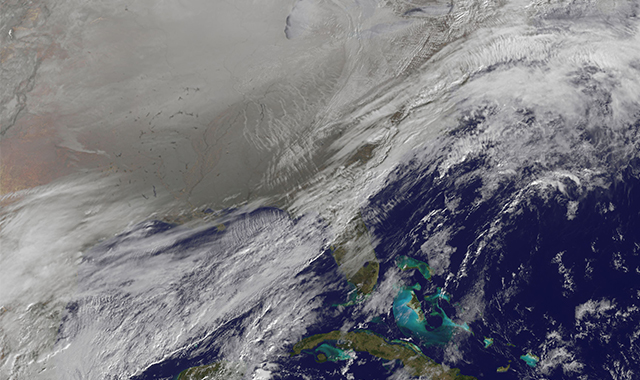
By Laura Barron-Lopez
Global warming may be contributing to the "polar vortex" causing frigid temperatures across most of the nation on Monday, according to some climate change researchers.
While it seems counter-intuitive, the research argues that plunging temperatures could come from changes in the jet stream caused by climate change.
Rutgers University climate scientist Jennifer A Francis has released a number of papers about changes in the jet stream brought about by warming Arctic temperatures.
Her conclusions suggest that warming Arctic air caused by greenhouse gas emissions has caused changing to the jet stream that is pushing colder Arctic air further south, causing temperatures to plunge from the High Plains to the Deep South.
The jet stream shift has sent frigid air across the central part of the country, and deeper into the south than normal.
Alaska, meanwhile, is being hit by unusually warm conditions and California is facing record-breaking drought, Francis said.
She said the strange weather is becoming more likely because of climate change.
"We can't say that these are extremes are because of climate change but we can say that this kind of pattern is becoming more likely because of climate change," Francis said.
NASA analysis has also drawn a link between the jet stream, climate change and colder temperatures.
A 2010 NASA analysis tied colder temperatures over the course of 2009 to an event similar to the wavy jet stream, called "Arctic oscillation" — a see-sawing pressure system over the North Pole. That oscillation pushed cold air to teh south.
The NASA analysis also said that despite cold snaps, and other weather changes being a part of naturally occurring patterns, they are still in line with a "globally warming world."
According to Francis, big fluctuations in the jet stream cause extreme weather conditions to hang around longer.
She argues greenhouse gas emissions are a key factor.
"The process of warming the Arctic is intensified due to greenhouse gas emissions," Francis said. "The Arctic is warming two to three times faster than the rest of the Northern Hemisphere."
MIT atmospheric scientist Kerry Emanuel said long-term climate change can only be seen by looking at detailed statistics.
“It's certainly plausible, at lease for awhile that a changing jet stream, may cause colder winters,” Emanuel said.
But he added that it is difficult to tie a direct link between individual events like the cold snap occurring in the Midwest and East Coast to global warming.
Emanuel added that that doesn't mean you can disregard global warming.
“If you cherry pick you can always find an excuse to go against [global warming,” Emanuel said.
Image Credit: Satellite Image Shows Entry of the Polar Vortex into the Northern U.S.

